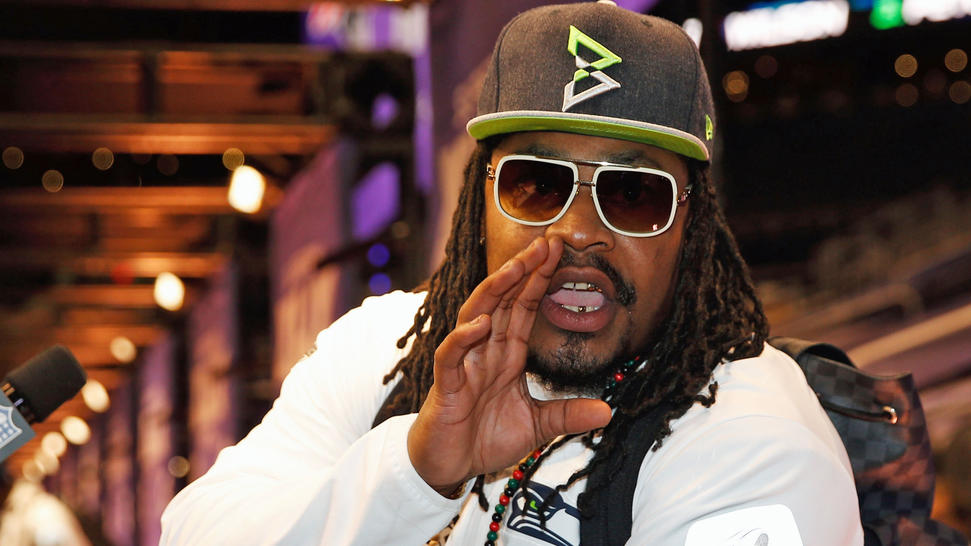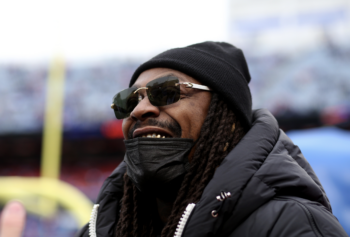Ray Austin, Co-founder and Commissioner of the groundbreaking Fan Controlled Football League was born to play football.
After a stellar career at Tennessee, the 6-foot-1, 190-pound defensive back was drafted by the New York Jets in the fifth round of the 1997 NFL Draft. He played for the Chicago Bears in the NFL and the Chicago Enforcers of the XFL and by 2001 he was out of pro sports.
Austin didn’t fall victim to the depression, bad finances, lack of opportunity and the inability to transition into a normal lifestyle that impedes the progress of many former athletes — especially those who don’t last long on the pro level.
He utilized his other talents and connections that he made throughout his career and eventually surfaced in 2013 as an actor on Bravo’s reality show, “100 Days of Summer.”
His journey has been one of perseverance, consistency, while always seeking knowledge and trying to remain a step ahead of the game.
Ironically, years after retiring from the NFL, he finds himself an entrepreneur and actor in the middle of a football and tech revolution as a co-founder and commissioner of the new Fan Controlled Football League, the next big thing in the digital, interactive, tech world.
Bringing Total Team Control To The Fans
“It’s been an eye-opening experience being in technology and the tech space because you don’t get to see a lot of African-Americans in tech,” Austin told The Shadow League in an exclusive interview back in 2019.
“If you look at Fan Control Football, American football is a US sport, our holy grail is to expand fan control sports. Can you imagine fan-controlled baseball and soccer, sports that are all around the world? And being able to engage with people all around the world, all having the same goals; controlling their organization and their team. We’re trying to be the glue to sports on the digital side.
Imagine scoring a TD as a fan and knowing you had something to do with what just happened on the field. As a fan, you can’t beat that type of engagement and that’s that heartbeat we are looking for.”
The Fan-Controlled Football League (FCFL) is exactly what it sounds like, a real-world sports league where the Fans are in charge. It’s like Madden in real life. All FCFL games are played in one Las Vegas location and live-streamed on Twitch, the world’s leading social video service and community for gamers and eSports, available on mobile, desktop, and tablets.
Via an interactive video overlay on Twitch or in the FCFL app, fans will call all of the plays in real-time for the 4-teams in the new Las Vegas-based league. The outcome of each fan vote will be relayed to the quarterback and executed on the field.
The Glacier Boyz are owned by NFL player Richard Sherman and rap superstar Quavo.
The Wild Aces are owned by Chargers running back Austin Eckeler and internet star Greg Miller.
The Beasts owners are former NFL star/entrepreneur Marshawn Lynch, Atlanta Dream part-owner/activist Renee Montogomery and Miro.
The Zappers are owned by raw and bold internet, announcing sensation Bob Menery and New York Mets pitcher Trevor May.
Designed for the digital fan, rather than the traditional stadium or arena, all of the games are played in a cutting-edge production studio where a truly interactive sports entertainment experience can be delivered in real time to any connected device on the planet. The field is 50 yards with eight-yard end zones and no kicking game.
In addition to play calling, each FCFL team is run by a virtual front office, putting fans in the Head General Manager role for the first time in sports, allowing them to determine each team’s name, logo, coach, and the players that make the roster via a fan-run draft. It’s a video game brought to life.
Austin is an example of what can happen when former athletes have a healthy transition from the field to other aspects of life. He wants to break down barriers for people of color in a rising enterprise and also continue to raise the popularity of American football on an international scale.
The Brain Trust
Austin collaborated with three other co-founders to make FCFL a reality.

SOHROB FARUDI
CO-FOUNDER & CEO
An accomplished international C-level executive and venture-backed entrepreneur. Has held the CEO role at multiple startups.

GRANT COHEN
CO-FOUNDER & CHIEF PRODUCT OFFICER
Experienced mobile app monetization startup entrepreneur who has helped lead companies through four positive acquisitions and a NASDAQ IPO.

PATRICK DEES
CO-FOUNDER & CHIEF GAMING OFFICER
Serial entrepreneur and dynamic executive involved with myriad successful startups. Co-Founded Talk About Wireless.
“We all have our own story on how we all came up with it ourselves, but it’s the fans who really came up with this,” Austin insisted. Anybody who’s ever sat and yelled at their TV after a bad play came up with this. I think we just were the ones who decided to execute it.”
Austin says he was in Chicago pursuing an acting career after his NFL career ended and in his spare time he developed a mobile app that allows fans to call the play in real time.
“I went to a semi-pro football league game,” said Austin, reflecting on when he first was introduced to the concept of fan-driven digitally-interactive pro sports. “I saw those guys play it.”
Austin went up into the stands and texted the coach a few play-calls. A sweep and a play action pass.
“He did it and I really saw it with my own eyes that I had something there,” Austin said.
Austin worked on the App for a while and then shelved it due to lack of funding. ore.
Then, as fate would have it, Austin says he ran into one of his former teammates, (former Chicago Bears safety) Tony Parrish. Parrish was working with current FCFL CEO and co-founder Sohrob Farudi. Farudi actually owned the Las Vegas Outlaws, an Arena Football League team, and he wanted it to be more engaging so he was interested in the fan-controlled concept.
He had already spoken to FCFL co-founder Grant Cohen, who had already built out a mobile website for a minor league baseball team to be fan controlled.
“So the four of us,” Austin tells the Shadow League, “we never knew each other. We all met for the first time and got together with the fourth co-founder Patrick Dees, who worked in gaming with Sohrob in his own company.
We all got together with our different backgrounds and said, “Let’s do this thing.”
Fans Make The Game Go
Every aspect of the FCFL is controlled by the fans. Traditional teams usually attract fans based on location.
“We want our teams to be connected by our team Captains,” said Austin. “We have different genres of celebrities who will serve as team owners and team captains: Marshawn Lynch, pro pitcher Trevor May, Richard Sherman, Quavo (Migos).”
Team Captain has to be there for his team. Promote his team, be present, come to the games, speak to the fans that work with the team. Even hang out with them after a big win. We want to merge fan bases and break down that wall between celebrity and fan by allowing them to engage with the team captain or owner of the team, weekly through various mediums.
We want our fans to be a part of every aspect of the league. From the wins to the losses to the celebration to the content from the media to the music, everything.”
There’s no limit on how many fans can vote for each play. Whatever play has the most voted that’s the play that is sent down to the quarterback. To be eligible, you just have to register on the site.
Austin’s League is ambitious, genius and groundbreaking, but how does he know it will actually work?
The Blue Print
We knew we’d have to test the concept, so the Digital Dream Team went out raised money on their own and purchased a football team in the Indoor Football League (IFL).
“In 2017 we had a football team called Salt Lake Screaming Eagles and we allowed the fans to do everything,” Austin said. “They picked the location, the name, the jerseys, the players, coaches and they picked the plays in real time.
We learned that fans can actually run a team, call plays, pick coaches, scout players, fire coaches.”
The Screaming Eagles roster was made up of players scouted off Youtube and Huddle. They competed against traditional football teams with real coaches and players and were 6-11 with the IFL’s third-ranked offense led by a Rookie of the Year quarterback found on social media.
“We were the only team in the League doing that,” Austin expressed with a sense of pride. We basically experimented going into a traditional football league that already existed for about 15 years…It was a tremendous proof of concept for us and now we’re taking that and putting it on steroids, sort of speak, with the FCFL. We actually had Facetime meetings with our fans so they knew and understood what we were doing during the week. “
The FCFL’s scouting process will be similar, but the league also has five combine dates where players can flex their skills live.
Transition: Gridiron To The Corporate Grind
Austin’s journey is one of the success stories involving retired NFL players and he wants other retired players to enjoy the same transition. The FCFL is not only an entertainment tool, but it allows Austin to have a direct effect on the future of the players who came across his path.
“When retirement comes in football it comes as such a shock to most players and you don’t know what to do,” said Austin.”And you have to instantly be able to turn that button on and figure out what the next move for you is. It was even challenging for me but I knew I had some skills I could depend on and for me, I’ve enjoyed transitioning and that’s something that I value and want to give back to a lot of players especially this younger generation.”
The FCFL is offering players more than just an opportunity to be part of a cutting-edge pro football enterprise. They will also get help with preparing for life after football.
“The players are going to get paid a salary and we’re opening up other opportunities for them.
“We are working on getting internships for our players. Me being a former NFL player understands that a lot of players give up experience time trying to pursue pro sports and once they are out they have no resume which makes it really difficult for them to compete for jobs in the corporate market without any experience. So we want to work with corporate sponsors to offer internships to players in the offseason. We want to offer the same opportunities that I had to players that want to reach their professional goals, but also realistically thinking about the future.”
Preparation Meets Perfect Timing
With the way COVID-19 has (temporarily) changed the entire dynamic of the way fans consume games, the future is now for the league.
If we all have to sit at home, and can’t watch a football game live, then we might as well be able to actively participate in the game we are watching right? Real-life video games with humans, former NFL stars even — as you might see in a movie.
Josh Gordon is out here Mossin’ dudes in his @fcflio debut.
Gordon, still suspended by #NFL, was released by @Seahawks before joining Johnny Manziel and adding star power to Ray Austin’s league. pic.twitter.com/90x7vg4MGp
— The Shadow League (@ShadowLeague) March 7, 2021
Austin says that if he didn’t have support from people in pursuing his options post-football, he might not be a living example of how you transition out of pro sports, but another cautionary tale.
“I laugh about my time on “100 Days of Summer” because people always ask me what’s harder football or acting,” Austin tells The Shadow League.
“I’d say acting is way harder. I was born to play football and acting is something I had to learn and understand its a craft. It’s probably helped me more in most of the things that I do. People see the jobs actors get but don’t realize all of the auditions I went on… and you gain a better respect for people who do the craft. I had to learn and study and take classes and Chicago was the best place for that. The actors, casting directors and agents really grew me up and honed my skills and knew exactly how to market me.”
Through healthy living and a sound mind, Austin has been able to make football the center of his many business endeavors while finding his niche in the soaring technological world and remaining relevant, hip and progressively ambitious.


